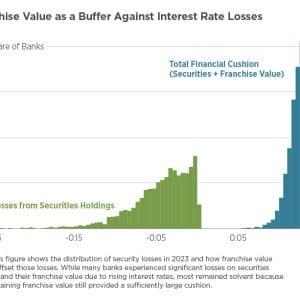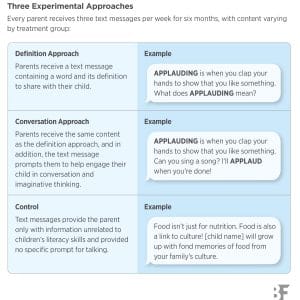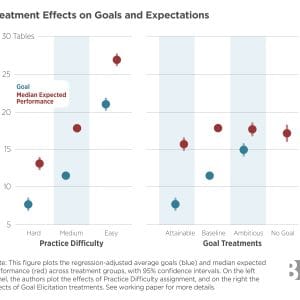
Language development is a fundamental aspect of human capital: the skills, knowledge, and abilities that individuals acquire through education, training, and experience, which enable them to realize their potential as productive members of society formation, and researchers continue to explore the most effective ways to support young children in acquiring new vocabulary. Evidence indicates that parental interaction plays a crucial role, yet precisely how much or why conversations with parents influence early vocabulary development remains unclear. These questions are particularly significant for children in low-income families, where parents are less frequently observed to engage their children in conversation.
In this paper, the authors run a six-month evaluation of Chat2Learn, a program they designed to increase how much parents talk to their children about vocabulary words using subjects of interest to the child. The authors randomize a sample of 600 low-income parents of preschool-aged children into three groups, summarized in Figure 1.
The authors’ two treatment arms reflect
distinct learning modalities. The definition approach emphasizes simply learning the word definition, while the conversation approach encourages parents to engage in open-ended discussions designed to foster curiosity in children. The authors hypothesized that the conversation approach would enhance children’s curiosity, which, in turn, could further support vocabulary development.

At both the beginning and end of the evaluation, the authors administer surveys to participating parents to assess their beliefs about their child’s skills, interests, and other attitudes and perceptions. Additionally, they evaluate children’s vocabulary and curiosity via Zoom before and after the intervention. By comparing results across the three experimental groups, the authors find the following:
- Both the definition and conversation approaches significantly improved children’s vocabulary knowledge compared to the control group, with no statistically significant difference between the two treatment effects. The observed gains were primarily driven by the acquisition of words included in the intervention.
- Among children who scored highly on the vocabulary assessment, the definition approach also enhanced vocabulary for words not explicitly included in the intervention, suggesting spillover effects on overall language development.
- The definition approach led to a five-percentage-point reduction in parents’ belief that intelligence is fixed, lowering this perception from a baseline average of 18%.
- Neither treatment approach affected parents’ levels of stress, fatigue, or enjoyment of learning activities.
This evaluation demonstrates that parents can effectively teach their children new words using simple, cost-effective tools like Chat2Learn. In principle, parents can teach their children an unlimited number of words. The relatively short duration of the intervention and the young age of participants limited exploration of longer-term effects.
Related UChicago Work
Making a Song and Dance About It: The Effectiveness of Teaching Children Vocabulary with Animated Music Videos
This paper uses a randomized controlled trial to evaluate the effectiveness of Big Word Club (BWC), a classroom program that uses music and dance videos for 3-5 minutes per day to increase vocabulary. The authors find that treated students scored higher on a test of words targeted by the program (0.30 SD) after four months of use and this effect persisted for two months.
It All Starts with Beliefs: Addressing the Roots of Educational Inequities by Shifting Parental Beliefs
The authors design two field experiments to explore if changing parental beliefs can be a pathway to improving parental investments in young children. In the first field experiment, over a six-month period starting three days after birth, we use informational nudges informing low-SES parents about skill formation and best practices to foster child development. In the second field experiment, we use a more intensive home visiting program consisting of two visits per month for six months, starting when the child is 24-30 months old. Both field experiments induce parents to revise their beliefs and increase investments in their child.
Boosting Parent-Child Math Engagement and Preschool Children’s Math Skills: Evidence from an RCT with Low-Income Families
This paper uses a randomized controlled trial to test whether high-quality digital apps and analog math materials could increase parental math engagement and child skills and whether the impact is enhanced with text messages aimed at managing parents’ behavioral biases. Relative to the control group, neither the analog math materials alone nor the analog materials with growth mindset messages increased child math skills during the intervention period. However, the analog math materials combined with messaging to manage present bias and the digital tablet with math apps increased child math skills by about 0.20 standard deviations (p=.10) measured six months after the intervention.










